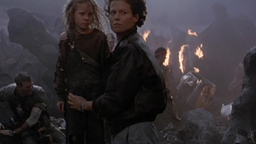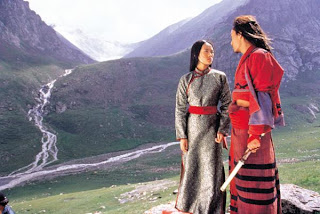These are all the foreign films that made the IMDB top 250 list
(
Link to the complete IMDB 250)

1.
Seven Samurai (Kurosawa, Japan, 1954) No. 13
2.
City of God (Meirelles, Brazil, 2002) No. 19
3. Amelie (Jeunet, France, 2001) No. 46
4. M (Lang, Germany, 1931) No. 55
5.
The Lives of Others (von Donnersmarck, Germany, 2006) No. 57
6.
Das Boot (Peterson, Germany, 1981) No. 63
7. Life is Beautiful (Benigni, Italy, 1997) No. 69
8.
Cinema Paradiso (Tornatore, Italy, 1988) No. 74
9. Pan's Labyrinth (del Toro, Spain, 2006) No. 76
10. Rashomon (Kurosawa, Japan, 1950) No. 81
11. Bicycle Thief (De Sica, Italy, 1948) No. 87
12.
Metropolis (Land, Germany, 1927) No. 94
13.
Downfall (Hirschbiegel, Germany, 2004) No. 95
14.
Oldboy (Park, Korea, 2003) No. 97
15. Princess Mononoke (Miyayaki, Japan, 1997) No. 109
16.
The Seventh Seal (Bergman, Sweden, 1957) No. 113
17. Yojimbo (Kurosawa, Japan, 1961) No. 123
18.
Grave of the Fireflies (Takahata, Japan, 1988) No. 125
19. Ran (Kurosawa, Japan, 1985) No. 126
20. Wild Strawberries (Bergman, Sweden, 1957) No. 131
21. Amores Perros (Inarritu, Mexico, 2000) No. 159
22.
The Wages of Fear (Clouzot, France, 1953) No. 166
23. Ikiru (Kurosawa, Japan, 1952) No. 167
24. Diabolique (Clouzot, France, 1955) No. 182
25.
Federico Fellini's 8 1/2 (Fellini, Italy, 1963) No. 187
26.
The Battle of Algiers (Pontecorvo, Italy, 1966) No. 194
27.
The 400 Blows (Truffaut, France, 1959) No. 195
28. La Strada (Fellini, Italy, 1954) No. 197
29. The Diving Bell and the Butterfly (Schnabel, France, 2007) No. 201
30. Persona (Bergman, Sweden, 1966) No. 202
31. The Passion of Joan of Arc (Dreyer, France, 1928) No. 210
32. Let the Right One In (Alfredson, Sweden, 2008) No. 214
33. Fanny and Alexander (Bergman, Sweden, 1982) No. 215
34. Nights of Cabiria (Fellini, Italy, 1957) No. 225
35. The Celebration (Vinterberg, Denmark-Sweden, 1998) No. 226
36. Infernal Affairs (Lau and Mak, Hong Kong, 2002) No. 227
37. A Separation (Farhadi, Iran, 2011) No. 228
38. Howl's Moving Castle (Miyazaki, Japan, 2004) No. 229
39. Three Colors: Red (Kieslowski, Fr-Switz-Poland, 1994) No. 245
40.
Spring, Summer, Fall, Winter.. and Spring (Kim, Korea, 2003) No. 247
Note: one film I left off is
Clint Eastwood's Letters From Iwo Jima, which is a U.S. film but is mostly in Japanese, as it's based on letters sent home by Japanese soldiers there, and tells that side of the battle for Iwo Jima.
Some of these at the top are cinema masterpieces, notably Seven Samurai, City of God, The Lives of Others, and Cinema Paradiso. Many think Kurosawa's Seven Samurai is the best film ever made.
I'm not sure why Amelie gets ranked so high, personally I like two other Jean-Pierre Jeunet films more:
A Very Long Engagement and
Micmacs - check them out, they are both excellent. Also, where the heck are John Salles' two excellent films from Brazil,
Central Station and
The Motorcycle Diaries - that's totally baffling. Also missing is
Twilight Samurai, which not only won numerous awards (37) but
won 12 Japanese academy awards out of 14 nominations.
The films here that I reviewed I think are excellent. Some that I didn't review are worthy films, I just haven't gotten around to reviewing them yet, such as M, Passion of Joan of Arc, Diabolique, Bicycle Thief, Rashomon, Yojimbo, Wild Strawberries, and Fanny and Alexander.
Others I didn't review because I didn't think they were worthy - among these are Nights of Cabiria, Pan's Labyrinth, Ran, Life Is Beautiful, Persona, and Infernal Affairs. These are all good films, just not great, imo. Amores Perros is a good film, but is very tough to watch, especially some scenes involving dogs, watch that one at your own risk if you love animals.
My personal 10 favorites that made their list:
1. Seven Samurai (Kurosawa)
2. Cinema Paradiso (Tornatore)
3. City of God (Meirelles and Lund)
4. The Lives of Others (von Donnersmarck)
5. Battle of Algiers (Pontecorvo)
6. The 400 Blows (Truffaut)
7. Das Boot (Peterson)
8. Oldboy (Park)
9. Spring, Summer, Fall, Winter.. and Spring (Kim Ki-Duk)
10. The Seventh Seal (Bergman)
Your results may vary; no wagering; void where prohibited; do not take while pregnant; may cause dizziness, blindness, heart attack, stroke, sudden death
























































